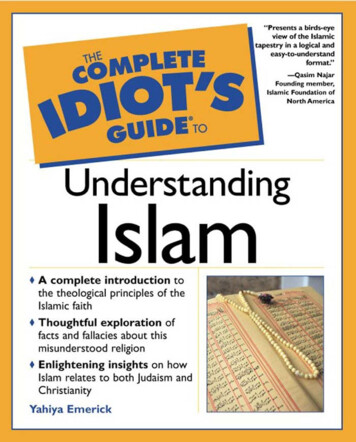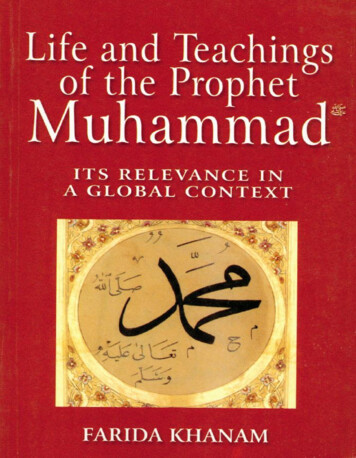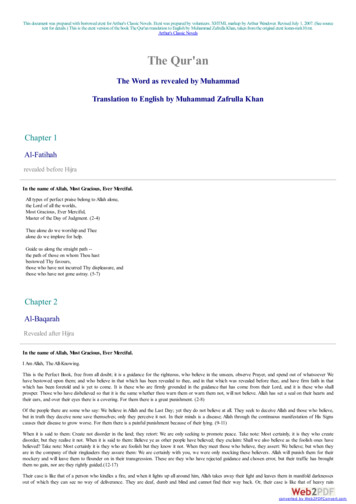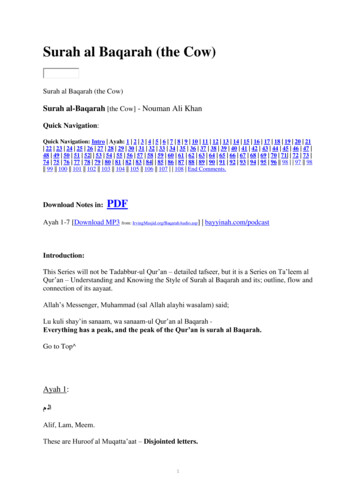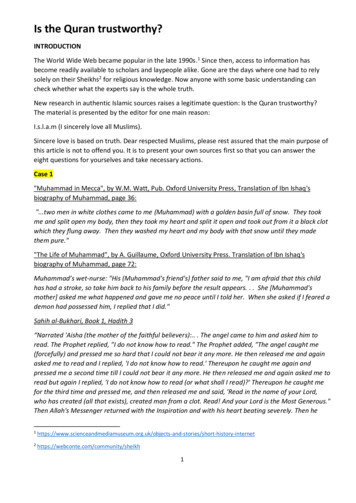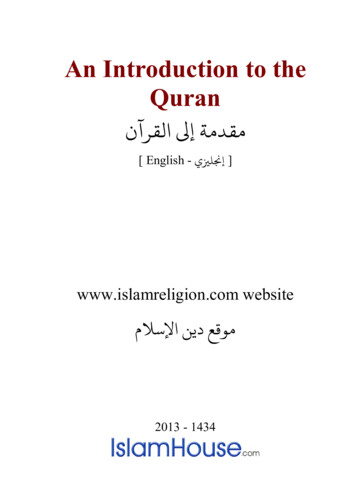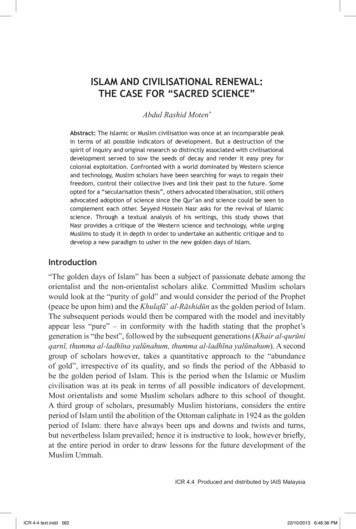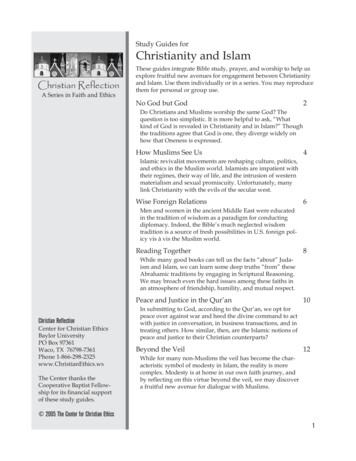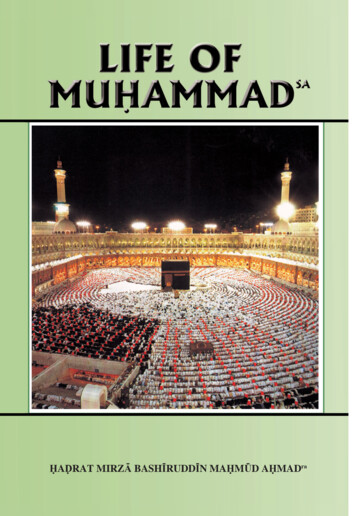
Transcription
LIFE OF MUHAMMADsaBYHADRAT MIRZA BASHIRUDDIN MAHMUD AHMAD2013ISLAM INTERNATIONAL PUBLICATINS LIMITED
Life of Muhammad saBY: HADRAT MIRZA BASHIRUDDIN MAHMUD AHMADKHALIFATUL MASIH IIFirst published in UK in 1990Second edition published in UK in 2005Third edition published in UK in 2009Fourth edition published in UK in Oct. 2012Fifth edition published in UK in New Format in Nov. 2012Sixth edition published in UK in Mar. 2013Re-printed in UK in Jan. 2014 ISLAM INTERNATIONAL PUBLICATIONS LTDPUBLISHED BY:Additional Wakalat-e-Tasnif (United Kingdom)IslamabadSheephatch Lane,Tilford, Surrey, GU10 2AQ, UKPrinted and bound in Great BritainNo part of this book may be reproduced in any form without priorpermission from the Publisher, except for the quotation of brief passages incriticism.British Library Cataloguing in Publication DataAhmad, Mirza Bashiruddin Mahmud 1889–1965The Life of Muhammad1. Islam Muhammad (Prophetsa)I. Title297.63ISBN: 1- 85372- 045- 3Contacts for Further uk,www.muslimsforpeace.org
About the AuthorThe Promised sonra of the Promised Messiah and Mahdias;the manifest Sign of Allah, the Almighty; the Word of God whoseadvent was prophesied by the Holy Prophet Muhammadsa and thePromised Messiahas as well as the past Prophets; a Star in thespiritual firmament for the like of which the world has to wait forhundreds of years to appear; the man of God, crowned with aspiritual halo from which radiated such scintillating rays of light aswould instil spiritual life into his followers and captivate and enthralthose who were not fortunate to follow him; an orator of suchphenomenal quality that his speeches would make his audience stayput for hours on end, come rain or shine, deep into the late hours ofthe evenings while words flowed from his tongue like honeydripping into their ears to reach the depths of their soul to fill themwith knowledge and invigorate their faith; the ocean of Divine andsecular knowledge; the Voice Articulate of the age; without doubtthe greatest genius of the 20th century; a man of phenomenalintelligence and memory; an epitome of the qualities of leadership;the one whose versatility cannot be comprehended—Hadrat MirzaBashiruddin Mahmud Ahmadra (1889-1965), Muslih Mau‘ud (thePromised Reformer) was the eldest son and the second successor(Khalifah) of the Promised Messiahas. He took charge of theAhmadiyya Jama‘at at the young age of 24 when the Jama‘at wasstill in its infancy and nourished it to its maturity for more than 50years with his spiritual guidance, prayers, tears, toil and blood. Notonly did he fortify the foundations of the community laid down bythe Promised Messiahas, but expanded the structure of the Jama‘at byinitiating various schemes, organizations, and programs taking hisinspiration from the Promised Messiahas and under the Divineguidance. His foremost concern, to which he devoted all his life, wasto accomplish the mission of the Promised Messiah—the dauntingtask of spreading the message of true Islam in its pristine purity tothe ends of the world. To achieve this, he initiated Tahrik-e-Jadidthrough which spread, and continues to spread, the missionary workall over the globe. His acute intelligence, keen intellect, deep andextensive scholarship and above all his God-given knowledgeiii
ivLife of Muhammadsaenabled him to produce a vast corpus of writings, speeches etc. Hisoeuvre is so vast that it will take many years to see the light ofpublication.When the promised Messiahas fervently prayed to God togrant him a Sign in support of Islam, Allah gave him the good tidingabout this son of his and said:" He will be extremely intelligent and will be filledwith secular and spiritual knowledge.Son, delight ofthe heart, high ranking, noble. A manifestation of theFirst and the Last, a manifestation of the True and theHigh; as if Allah has descended from heaven Behold alight comes We shall pour Our Spirit into him"[Revelation of 20th February 1886]*Translation from Urdu by Sir Muhammad Zafrullah Khan in his Englishtranslation of Tadhkirah—the book containing dreams, visions and verbalrevelations vouchsafed to the Promised Messiahas. (Revised edition, 2009.)[Publisher]*
CONTENTSForeword . ixArabia At The Time Of The Prophet'ssa Birth . 1Holy Prophet'ssa Marriage With Khadijara . 7The Prophetsa Receives His First Revelation . 9First Converts . 11The Faithful Persecuted . 12The Message Of Islam . 18Emigration To Abyssinia . 21‘Umarra Accepts Islam . 23Persecution Intensifies . 25The Prophetsa Goes To Ta’if . 27Islam Spreads To Medina . 30First Pledge Of ‘Aqaba . 35The Hijra . 37Suraqara Pursues The Prophet . 39The Prophetsa Arrives At Medina . 41Abu Ayyub Ansarira As Prophet'ssa Host . 42Life Unsafe At Medina . 44Pact Between Various Tribes Of Medina . 47Meccans Preparing To Attack Medina . 50Battle Of Badr . 52A Great Prophecy Fulfilled . 59Battle Of Uhud . 62Victory Converted Into Defeat . 64Rumour Of Prophet'ssa Death Reaches Medina . 70Encounter With Banu Mustaliq. 80Battle Of The Ditch . 83Fight Against Heavy Odds . 85Treachery Of Banu Quraiza . 88The Confederates Disperse . 95Banu Quraiza Punished . 97Sa‘D'sra Award In Harmony With The Bible. 100Did The Prophetsa Seek To Continue Warfare? . 103Teachings Of Judaism And Christianity About War . 106The Qur’an On War And Peace . 108v
viLife of MuhammadsaThe Prophet'ssa Precepts About War . 116Sporadic Attacks By Disbelievers . 119The Prophetsa Leaves For Mecca With One Thousand FiveHundred Companions . 121Treaty Of Hudaibiya . 125Prophet'ssa Letters To Various Kings. 128Letter To The King Of Iran . 133The Letter To The Negus . 135Letter To The Ruler Of Egypt . 137Letter To Chief Of Bahrain . 139Fall Of Khaibar . 140The Prophet'ssa Vision Fulfilled . 144Battle Of Mauta . 147The Prophetsa Marches On Mecca With Ten ThousandFollowers . 152Fall Of Mecca . 154The Prophetsa Enters Mecca. 157Ka‘Ba Cleared Of Idols . 163The Prophetsa Forgives His Enemies . 165‘Ikrimara Becomes Muslim . 167Battle Of Hunain . 169"The Prophetsa Of God Calls You" . 171A Sworn Enemy Becomes A Devoted Follower . 174The Prophetsa Distributes Booty . 175Machinations Of Abu ‘Amir . 177The Expedition Of Tabuk . 178The Last Pilgrimage . 182The Prophetsa Gives Hints Of His Death . 186Last Days Of The Prophetsa . 189The Prophetsa Passes Away . 191The Prophet'ssa Personality And Character . 195The Prophet'ssa Purity Of Mind And Cleanliness Of Body . 196The Prophet'ssa Simple Life . 198Relationship With God . 204Disapproval Of Penance . 212Attitude Towards His Wives . 214
Life of MuhammadsaviiHigh Moral Qualities . 215His Self-Control . 217Justice And Fair Dealing . 219Regard For The Poor . 221Safeguarding The Interests Of The Poor . 225Treatment Of Slaves . 226Treatment Of Women . 227Attitude Towards The Dead. 231Treatment Of Neighbours . 232Treatment Of Relatives . 233Keeping Good Company . 236Safeguarding People's Faith. 236Overlooking Faults Of Others . 237Patience In Adversity. 240Mutual Cooperation . 241Truthfulness . 242Inquisitiveness . 244Frank And Straightforward Dealing . 244Pessimism . 245Cruelty To Animals . 245Tolerance In Religious Matters . 246Bravery . 247Consideration Towards The Uncultured . 247The Fulfilling Of Covenants . 248Deference Towards Servants Of Humanity . 248Life Of The Prophetsa An Open Book . 249Index Of Subject Matter . 251Index Of Names . 259Index Of Places . 263
ForewordLife of Muhammadsa is part of Introduction to thestudy of the Holy Qur’an by Hadrat Mirza BashirduddinMahmud Ahmadra. The Introduction was translated intoEnglish by Qadi Muhammad Aslam and was firstpublished in 1949 from London. Since then it hasappeared in several editions. Life of Muhammadsa hasalso appeared in several editions and is out of stocknow. We are publishing it again with an index which theoriginal English edition did not have. We have also resetit to make it more attractive. Needless to say that it ismuch in demand and we very much hope that thepresent edition will meet this demand. Some minorcorrections have also been made.The name of Muhammadsa, the Holy Prophet of Islam,has been followed by the symbol sa, which is anabbreviation for the salutation 'may peace and blessingsof Allah be upon him.' The names of other prophets andmessengers are followed by the symbol as, anabbreviation for 'on whom be peace.' The actualsalutations have not generally been set out in full, butthey should nevertheless, be understood as beingrepeated in full in each case. The symbol ra is used withthe name of the Disciples of the Holy Prophet sa andthose of the Promised Messiahas. It stands for RadiAllahu ‘anhu/‘anha/‘anhum (May Allah be pleased withhim/with her/with them).In transliterating Arabic words we have followed thefollowing system adopted by the Royal Asiatic Society. ا at the beginning of a word, pronounced as a, i, u preceded bya very slight aspiration, like h in the English word 'honour'. ث th, pronounced like th in the English word 'thing'. ح h, a guttural aspirate, stronger than h. خ kh, pronounced like the Scotch ch in 'loch'. ذ dh, pronounced like the English th in 'that'. ص s, strongly articulated s.ix
xLife of Muhammadsa ض ط ظ ع d, similar to the English th in 'this'.t, strongly articulated palatal t.z, strongly articulated z.‘, a strong guttural, the pronunciation of which must belearnt by the ear. غ gh, a sound approached very nearly in the r 'grasseye' inFrench, and in the German r. It requires the muscles of thethroat to be in the 'gargling' position whilst pronouncing it. ق q, a deep guttural k sound. ء ’, a sort of catch in the voice.Short vowels are represented by:a for(like u in 'bud');i for(like i in 'bid');u for(like oo in 'wood');Long vowels by:a foror(like a in 'father');i for ي or(like ee in 'deep');u for و (like oo in 'root');Other:ai for ي (like i in 'site') ;au for و (resembling ou in 'sound').The consonants not included in the above list havethe same phonetic value as in the principal languages ofEurope.We have not transliterated Arabic, Persian and Urduwords which have become part of English language, e.g.,Islam, Mahdi, Qur’an, Hijra, Ramadan, Rahman,Hadith, Zakat, ulema, umma, sunna, kafir etc.For quotes straight commas (straight quotes) areused to differentiate them from the curved commas usedin the system of transliteration, ‘ for ﻉ , ’ for ء . Commasas punctuation marks are used according to the normalusage.The Publishers In Arabic words like ( ﺷﻴﺦ Shaikh) there is an element of diphthong whichis missing when the word is pronounced in Urdu.
{Life of MuhammadsaARABIA AT THE TIME OF THE PROPHET'SsaBIRTHThe Prophetsa was born in Mecca in August 570 A.D.He was given the name Muhammadsa which means, thePraised One. To understand his life and character wemust have some idea of the conditions which obtainedin Arabia at the time of his birth.When he was born almost the whole of Arabiabelieved in a polytheistic form of religion. The Arabstraced their descent to Abrahamas. They knew thatAbrahamas was a monotheistic Teacher. In spite of this,they entertained polytheistic beliefs and were given topolytheistic practices. In defence, they said that somehuman beings are outstanding in their contact withGod. Their intercession on behalf of others is acceptedby God. To reach Him is difficult for ordinary humanbeings. They must have others to intercede for them inorder to obtain God's pleasure and help. Thus they wereable to combine their reverence for Abrahamas with theirown polytheistic beliefs. Abrahamas, they said, was aholy man. He was able to reach God withoutintercession, whilst ordinary Meccans could not do so.The people of Mecca, therefore, had made idols of holyand righteous persons, and these they worshipped andto these they made offerings in order to please Godthrough them. This attitude was primitive, illogical andfull of defects. But the Meccans were not worried bythese. They had not had a monotheistic Teacher for along time, and polytheism, once it takes root, spreadsand knows no bounds. The number of gods begins toincrease. At the time of the Prophet'ssa birth, it is said1
2Life of Muhammadsathat in the Ka‘ba alone, the Sacred Mosque of all Islamand the house of worship built by Abrahamas and hisson Ishmael, there were 360 idols. It seems that forevery day of the lunar year the Meccans had an idol. Inother big centres there were other idols, so that we cansay that every part of Arabia was steeped in polytheisticbelief. The Arabs were devoted to the culture of speech.They were much interested in their spoken languageand were very keen on its advance. Their intellectualambitions, however, were scant. Of History, Geography,Mathematics, etc., they knew nothing. But as they werea desert people and had to find their way about in thedesert without the assistance of landmarks, they haddeveloped a keen interest in Astronomy. There was inthe whole of Arabia not a single school. It is said that inMecca only a few individuals could read and write.From the moral point of view the Arabs were acontradictory people. They suffered from some extrememoral defects but at the same time they possessed someadmirable qualities. They were given to excessivedrinking. To become drunk and to run wild under theeffect of drink was for them a virtue, not a vice. Theirconception of a gentleman was one who should entertainhis friends and neighbours to drinking bouts. Every richman would hold a drinking party at least five times aday. Gambling was their national sport. But they hadmade of it a fine art. They did not gamble in order tobecome rich. Winners were expected to entertain theirfriends. In times of war, funds were collected throughgambling. Even today we have the institution of prizebonds to raise money for war. The institution has beenresuscitated in our time by the people of Europe andAmerica. But they should remember that in this theyonly imitate the Arabs. When war came, Arabian tribeswould hold a gambling party. Whoever won had to bearthe greater part of the expenses of the war.Of the amenities of civilized life, the Arabs knewnothing. Their chief occupation was trade, and to thisend they sent their caravans to far-off places, such as
Life of Muhammadsa3Abyssinia, Syria, Palestine and even India. The richamong them were great admirers of Indian swords. Theirclothing needs were supplied largely by Yemen andSyria. The trading centres were the towns. The rest ofArabia, excepting Yemen and some northern parts, wasBedouin. There were no permanent settlements, orplaces of habitation. The tribes had divided the countrybetween them so that members of a tribe wanderedabout freely in their part of the country. When the watersupply in any place was exhausted, they would move onto some other place and settle down. Their capitalconsisted of sheep, goats and camels. From the woolthey made cloth, and from the skins they made tents.What was left over they sold in the market. Gold andsilver were not unknown, but they were certainly veryrare possessions. The poor and the common folks madeornaments of cowries and sweet-smelling substances.Seeds of melons were cleaned, dried and strung togetherto make necklaces. Crime and immoralities of variouskinds were rampant. Theft was rare but dacoity wascommon. To attack and to dispossess one another wasregarded a birthright. But, at the same time, theyhonoured their word more than any other people.Should an individual go to a powerful leader or tribe andask for protection, that leader or tribe was honourbound to protect that individual. If this was not done,the tribe lost caste throughout Arabia. Poetscommanded great prestige. They were honoured asnational leaders. Leaders were expected to possess greatpowers of speech and even to be able to compose verse.Hospitality had developed into a national virtue. Aforlorn traveller on arrival at the headquarters of a tribewould be treated as an honoured guest. The bestanimals would be slaughtered for him and the utmostconsideration shown. They did not care who the visitorwas. It was enough that a visitor had arrived. The visitmeant an increase of status and prestige for the tribe. Itbecame the tribe's duty, therefore, to honour the visitor.By honouring him it honoured itself. Woman in this
4Life of MuhammadsaArab society had no status and no rights. Among them itwas thought honourable to put baby girls to death. It isa mistake, however, to think that infanticide waspractised on a country-wide scale. Such a dangerousinstitution could not flourish throughout a country.That would have meant the extinction of the race. Thetruth is that in Arabia—or for that matter in India orany other country where infanticide has ever existed, ithas been confined only to certain families. The Arabfamilies who practised it either had an exaggeratednotion of their social status or they were constrained inother ways. Possibly they were unable to find suitableyoung men for their daughters to marry; knowing this,they put to death their baby girls. The evil of thisinstitution lies in its savageness and its cruelty, not inthe results which it has in terms of a nation'spopulation. Different methods were used for killing babygirls, among them burying alive and strangulation.Only the real mother was regarded as a mother inArab society. Step-mothers were not regarded asmothers and there was no ban on a son's marrying hisstep-mother on the death of his father. Polygamousmarriages were very common, and there was no limit tothe number of wives a man could take. More than onesister could also be taken to wife by the same person atone and the same time.The worst treatment was meted out by combatantsides to one another in war. Where hatred was strong,they did not hesitate to split the bodies of the wounded,take out parts and eat them in cannibal fashion. Theydid not hesitate to mutilate the bodies of their enemies.Cutting off the nose or ears, or plucking out an eye wasa common form of cruelty practised by them. Slaverywas widespread. Weak tribes were made slaves. Theslave had no accepted status. Every master did as heliked with his slaves. No action could be taken against amaster who maltreated his slave. A master could murderhis slave without having to answer for it. If one mastermurdered another's slave, even then the penalty was notdeath. All that was required of him was to compensatethe aggrieved master suitably. Women-slaves were used
Life of Muhammadsa5to satisfy sexual desires. The children born of suchunions were also treated as slaves. Women-slaves whobecame mothers remained slaves. In terms of civilizationand social advance the Arabs were a very backwardpeople. Kindness and consideration to one another wereunknown. Woman had the worst status possible. Stillthe Arabs possessed some virtues. Individual bravery,for instance, sometimes reached a very high level.It was among such people that the Holy Prophetsa ofIslam was born. His father ‘Abdullah had died before hisbirth. Accordingly, he and his mother Amina had to belooked after by the grandfather, ‘Abdul Muttalib. Thechild Muhammadsa was suckled by a countrywomanwho lived in a place near Ta’if. It was a custom in Arabiain those days to hand over children to women in thecountry, whose duty was to bring up the children, totrain their speech and to give them a good start in bodilyhealth. When the Prophetsa was in his first year*, hismother died while travelling from Medina to Mecca andhad to be buried en route. The child was brought toMecca by a woman-servant and handed over to thegrandfather. When he was in his eighth year, hisgrandfather also died, after which Abu Talib, his uncle,became his guardian, this being the wish expressed in awill by the grandfather. The Prophetsa had two or threeopportunities to travel out of Arabia. One of theseoccurred when at the age of twelve he went in thecompany of Abu Talib to Syria. It seems that thisjourney took him only to the south-eastern towns of* A: In Biharul-Anwar Imam Baqir narrates on the authority of Waqidi thatAminah, the mother of the Holy Prophetsa, died when he was four monthsold, thus, he was an orphan when he was only four months old. (BiharulAnwaril-Jami‘ati li-Durari Akhbaril-A’immatil-Athar, Babu Mansha’ihi waRada‘ihi wa ma zahara min I‘jazihi ‘inda dhalika ila Nubuwwatihi bySheikh Muhammad Baqir Majlisi, vol.15, p.194; published by Al-AmirahBeirut, First edition 2008.)B: However, according to Ibni Hisham, Hadrat Aminah, the mother of theHoly Prophetsa, died when he was six years old. (Siratun-Nabawiyyah byIbni Hisham, Babu Wafati Aminata wa Hali Rasulillahi ma‘a Jaddihi ‘AbdilMuttalib ba‘daha, p.134, published by Darul-Kutubil-‘Ilmiyyah Beirut,Lebanon, First edition 2001.)
6Life of MuhammadsaSyria, for in historical references to this journey there isno mention of places like Jerusalem. From now onwardsuntil he grew up to young manhood he remained inMecca. From very childhood he was given to reflectionand meditation. In the quarrels and rivalries of othershe took no part, except with a view to putting an end tothem. It is said that the tribes living in Mecca and theterritories around, tired of unending blood-feuds,resolved to found an association the purpose of whichwas to help victims of aggressive and unjust treatment.When the Holy Prophetsa heard of this, he gladly joined.Members of this association gave an undertaking in thefollowing terms:They will help those who were oppressed and will restorethem their rights, as long as the last drop of waterremained in the sea. And if they do not do so, they willcompensate the victims out of their own belongings (SiratIbni Hisham by Imam Suhaili).It seems that no other member of this associationwas ever called upon to discharge the undertakingsolemnly entered into by members of this association.But opportunity came to the Holy Prophetsa when hehad announced his Mission. His worst enemy was AbuJahl, a chief of Mecca. He preached social boycott andpublic humiliation of the Prophetsa. About that time aperson from outside came to Mecca. Money was due tohim from Abu Jahl, but Abu Jahl refused to pay. Hementioned this to people in Mecca. Some young men,out of sheer mischief, suggested that he shouldapproach the Prophetsa. They thought that the Prophetsawould refuse to do anything for fear of the generalopposition to him and particularly for fear of theopposition of Abu Jahl. If he refused to help this man,he would be said to have broken his pledge to theassociation. If, on the other hand, he did not refuse andchose to approach Abu Jahl for the restitution of thisloan, Abu Jahl was certain to turn him away withcontempt. This man went to the Prophetsa andcomplained to him about Abu Jahl. The Prophetsa,hesitating not a minute, stood up, went with the man
Life of Muhammadsa7and knocked at Abu Jahl's door. Abu Jahl came out andsaw that his creditor was standing with the Prophetsa.The Prophetsa mentioned the loan and suggested itspayment. Abu Jahl was taken aback and, making noexcuses, paid at once. When the other chiefs of Meccaheard of this they reproved Abu Jahl, telling him howweak and self-contradictory he had proved. He preachedthe social boycott of the Prophetsa, yet he himselfaccepted direction from the Prophetsa and paid a loan onhis suggestion. In self-defence, Abu Jahl pleaded thatany other person would have done the same. He toldthem that as he saw the Prophetsa standing at his door,he also saw two wild camels standing one on each side,ready to attack. We cannot say what this experiencewas. Was it a miraculous appearance designed to upsetAbu Jahl or was it the awe-inspiring presence of theProphetsa which produced this hallucination? A manhated and oppressed by a whole town had taken thecourage to go alone to the leader of that town anddemand the restitution of a loan. Maybe this veryunexpected sight frightened Abu Jahl and for a momentmade him forget what he had sworn to do against theProphetsa, and forced him to do as the Prophetsasuggested (Hisham).HOLY PROPHET'Ssa MARRIAGE WITH KHADIJAraWhen the Prophetsa was about twenty-five years old,his reputation for integrity and fellow-feeling had spreadover the whole of the town. People would point admiringfingers at him and say, here was a man who could betrusted. This reputation reached the ears of a richwidow who approached the Prophet'ssa uncle, Abu Talib,to let his nephew lead a trading caravan of hers to Syria.Abu Talib mentioned this to the Prophetsa and theProphetsa agreed. The expedition met with great successand brought unexpected profits. The rich widow,Khadijara, was convinced that the success of the caravanwas due not only to the conditions of the market in
8Life of MuhammadsaSyria, but also to the integrity and efficiency of itsleader. She interrogated her slave, Maisara, on thissubject, and Maisara supported her view and told herthat the honesty and sympathy with which this youngleader of the caravan had managed her af
iii About the Author The Promised son ra of the Promised Messiah and Mahdi as; the manifest Sign of Allah, the Almighty; the Word of God whose advent was prophesied by the Holy Prophet Muhammad sa and the Promised Messiah as as well as the past Prophets; a Star in the spiritual firmament for the like of which the world has to wait for
